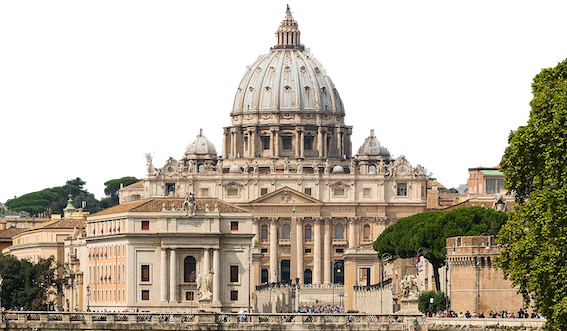
大航海時代の教説批判とカソリック教会
The
Critique against the “Doctrine
of Discovery,” by the Roman Catholic Church

★日本のカソリック教徒に告ぐ
バチカン(ローマ・カソリック)は新大陸時代(=大航海時代)における過去の教会の「征服の
ドクトリン」に対する批判的見解——とりわけ「先住民の権利に関する国連宣言(UNDRIP)2007」への強い支持——を表明する。宣言から15年以上
もたってこのような支持は一方では鈍重でなんでこんなに時間がかかったのかと皮肉も言いたいが、私は評価したい。そして他方では日本のカソリック教徒も神
への祈りと共に、教皇フランシスコ1世がどこの出身で、その土地ではどのような政治的歴史をもつのか、そして、バチカンがこの間、これについて議論をして
き、そして、なぜ今このようなアナウンスを出したたことにもっと積極的に自覚してほしい。目覚めよ!!日本のカソリックの聖職者よそして教徒よ!
| Joint Statement of
the Dicasteries for Culture and Education and for Promoting Integral
Human Development on the “Doctrine of Discovery”, 30.03.2023 1. In fidelity to the mandate received from Christ, the Catholic Church strives to promote universal fraternity and respect for the dignity of every human being. 2. For this reason, in the course of history the Popes have condemned acts of violence, oppression, social injustice and slavery, including those committed against indigenous peoples. There have also been numerous examples of bishops, priests, women and men religious and lay faithful who gave their lives in defense of the dignity of those peoples. 3. At the same time, respect for the facts of history demands an acknowledgement of the human weakness and failings of Christ’s disciples in every generation. Many Christians have committed evil acts against indigenous peoples for which recent Popes have asked forgiveness on numerous occasions. 4. In our own day, a renewed dialogue with indigenous peoples, especially with those who profess the Catholic Faith, has helped the Church to understand better their values and cultures. With their help, the Church has acquired a greater awareness of their sufferings, past and present, due to the expropriation of their lands, which they consider a sacred gift from God and their ancestors, as well as the policies of forced assimilation, promoted by the governmental authorities of the time, intended to eliminate their indigenous cultures. As Pope Francis has emphasized, their sufferings constitute a powerful summons to abandon the colonizing mentality and to walk with them side by side, in mutual respect and dialogue, recognizing the rights and cultural values of all individuals and peoples. In this regard, the Church is committed to accompany indigenous peoples and to foster efforts aimed at promoting reconciliation and healing. 5. It is in this context of listening to indigenous peoples that the Church has heard the importance of addressing the concept referred to as the “doctrine of discovery.” The legal concept of “discovery” was debated by colonial powers from the sixteenth century onward and found particular expression in the nineteenth century jurisprudence of courts in several countries, according to which the discovery of lands by settlers granted an exclusive right to extinguish, either by purchase or conquest, the title to or possession of those lands by indigenous peoples. Certain scholars have argued that the basis of the aforementioned “doctrine” is to be found in several papal documents, such as the Bulls Dum Diversas (1452), Romanus Pontifex (1455) and Inter Caetera (1493). 6. The “doctrine of discovery” is not part of the teaching of the Catholic Church. Historical research clearly demonstrates that the papal documents in question, written in a specific historical period and linked to political questions, have never been considered expressions of the Catholic faith. At the same time, the Church acknowledges that these papal bulls did not adequately reflect the equal dignity and rights of indigenous peoples. The Church is also aware that the contents of these documents were manipulated for political purposes by competing colonial powers in order to justify immoral acts against indigenous peoples that were carried out, at times, without opposition from ecclesiastical authorities. It is only just to recognize these errors, acknowledge the terrible effects of the assimilation policies and the pain experienced by indigenous peoples, and ask for pardon. Furthermore, Pope Francis has urged: “Never again can the Christian community allow itself to be infected by the idea that one culture is superior to others, or that it is legitimate to employ ways of coercing others.” 7. In no uncertain terms, the Church’s magisterium upholds the respect due to every human being. The Catholic Church therefore repudiates those concepts that fail to recognize the inherent human rights of indigenous peoples, including what has become known as the legal and political “doctrine of discovery”. 8. Numerous and repeated statements by the Church and the Popes uphold the rights of indigenous peoples. For example, in the 1537 Bull Sublimis Deus, Pope Paul III wrote, “We define and declare [ ... ] that [, .. ] the said Indians and all other people who may later be discovered by Christians, are by no means to be deprived of their liberty or the possession of their property, even though they be outside the Christian faith; and that they may and should, freely and legitimately, enjoy their liberty and possession of their property; nor should they be in any way enslaved; should the contrary happen, it shall be null and have no effect”. 9. More recently, the Church’s solidarity with indigenous peoples has given rise to the Holy See’s strong support for the principles contained in the United Nations Declaration on the Rights of Indigenous Peoples. The implementation of those principles would improve the living conditions and help protect the rights of indigenous peoples as well as facilitate their development in a way that respects their identity, language and culture. |
「大航海時代の教説(ドクトリン)」に関する文化・教育および総合的な
人間形成の促進に関する共同声明、2023.03.30 1. カトリック教会は、キリストから受けた使命に忠実に、普遍的な友愛とすべての人間の尊厳の尊重を促進するために努力する。 2. このため、歴史の中で、教皇たちは、先住民族に対するものを含め、暴力、抑圧、社会的不公正、奴隷制の行為を非難してきた。また、これらの民族の尊厳を守 るために命を捧げた司教、司祭、女性・男性修道者、信徒が数多く存在した。 3. 同時に、歴史の事実を尊重することは、どの時代においても、キリストの弟子たちの人間的な弱さと失敗を認めることを要求します。多くのキリスト教徒が先住 民族に対して悪事を働いたが、最近の教皇は何度も許しを求めている。 4. 現代では、先住民族、特にカトリックの信仰を持つ人々との新たな対話によって、教会は先住民族の価値観や文化をよりよく理解することができるようになっ た。彼らの協力により、教会は、彼らが神と祖先からの神聖な贈り物と考える土地の収用や、当時の政府当局が推進した、彼らの土着文化を排除しようとする強 制同化政策による、過去と現在の彼らの苦しみについて、より大きな認識を持つようになった。教皇フランシスコが強調しているように、彼らの苦しみは、植民 地化の考え方を捨て、すべての個人と民族の権利と文化的価値を認め、相互尊重と対話の中で、彼らと肩を並べて歩むことを強く求めるものである。この点で、 教会は、先住民に同行し、和解と癒しを促進することを目的とした努力を促進することを約束する。 5. 教会が "発見の教義 "と呼ばれる概念に取り組むことの重要性を耳にしたのは、このような先住民の声に耳を傾ける文脈の中であった。発見」の法的概念は、16世紀以降、植民地 支配国によって議論され、19世紀のいくつかの国の裁判所の法学において特に表現された。それによると、入植者による土地の発見は、先住民によるその土地 の所有権または占有を、購入または征服によって消滅させる独占権を与えるというものである。ある学者は、前述の「教義」の基礎は、Dum Diversas(1452年)、Romanus Pontifex(1455年)、Inter Caetera(1493年)などの教皇庁文書にあると論じている。 6. 「発見の教義(ドクトリン)」はカトリック教会の教えの一部ではない。歴史的研究は、特定の歴史的時代に書かれ、政治的問題と結びついた問題の法王庁文書 が、決してカトリックの信仰の表現とみなされないことを明確に示している。同時に、教会は、これらの教皇庁文書が、先住民の平等な尊厳と権利を十分に反映 していなかったことを認めている。教会はまた、これらの文書の内容が、時には教会当局の反対もなく行われた先住民族に対する不道徳な行為を正当化するため に、競合する植民地権力によって政治的目的のために操作されたことを認識している。これらの誤りを認識し、同化政策のひどい影響と先住民が経験した痛みを 認め、赦しを請うことは正しい。さらに、教皇フランシスコはこう促している:「キリスト教共同体が、ある文化が他の文化より優れているという考えや、他の 文化を強制する方法を採用することが正当であるという考えに感染することを、二度と許すことはできない」。 7. 教会のマヒステリウムは、明確な言葉で、すべての人間に敬意を払うことを支持する。したがって、カトリック教会は、法的・政治的な「発見の教義」として知 られるようになったものを含め、先住民の固有の人権を認めないそれらの概念を否定する。 8.教会とローマ教皇による、先住民の権利を支持する数多くの、そして繰り返される声明。例えば、教皇パウロ3世は、1537年のSublimis Deus の中で、「我々は、(中略)前記インディアンおよび後にキリスト教徒によって発見されるかもしれない他のすべての人々が、たとえキリスト教の信仰から外れ ていても、決してその自由や財産の所有権を奪われることはなく、自由かつ合法的に、その自由と財産の所有権を享受し、いかなる方法でも奴隷にされてはなら ない、反対のことが起こったとしてもそれは無効かつ何の効果もないことを明確にし宣言します」と記している。 9. さらに最近では、教会と先住民族との連帯が、「先住民の権利に関する国連宣言」に含まれる原則に対する聖座の強い支持を生んでいる。これらの原則の実施 は、先住民族の生活条件を改善し、権利の保護に役立つだけでなく、彼らのアイデンティティ、言語、文化を尊重する方法で彼らの開発を促進することになる。 |
| https://press.vatican.va/content/salastampa/en/bollettino/pubblico/2023/03/30/230330b.html | https://www.deepl.com/ja/translator |
| Les presento la imagen que
representa el permiso oficial para el saqueo, el genocidio, el
etnocidio, la esclavitud y las violaciones cometidas por España en
América contra las personas nativas que ya habitaban estos territorios.
No es una opinión. Es un documento. Lo que estás viendo es una de las
últimas páginas de la bula papal Inter caetera, emitida en 1493, justo
después del primer viaje de Colón. Este documento fue emitido desde
Roma y hoy se conserva en el Archivo General de Simancas, con
referencia PTR, LEG, 38, 5, 2. No es simbólico. Es un acto jurídico
vil. En ese momento, la Iglesia católica ya le estaba concediendo
tierras a Portugal. Y entonces entra Isabel I de Castilla.
Isabel ambiciosa, deshumanizada y, sí, también envidiosa como cualquier
gobernante imperial no iba a quedarse fuera del reparto. Así que activa
su palanca, contacto, conecte o como le quieres llamar con algun
sinónimo de nuestro basto idioma mexicano El Papa Alejandro VI,
español, de la familia Borgia,
profundamente ligado a Castilla…le concede el mundo. Y lo dice así,
textual: “ Por nuestra mera liberalidad, ciencia cierta y plena
autoridad apostólica, donamos, concedemos y asignamos a vosotros y a
vuestros herederos y sucesores todas las islas y tierras firmes
descubiertas y por descubrir…”
Y luego viene la línea imaginaria: “…trazando una línea desde el polo
ártico hasta el polo antártico, a cien leguas al oeste de las islas
Azores y Cabo Verde.” Así. Así se repartieron América. Pero espérate,
porque aquí viene lo más grave. El mismo documento remata diciendo: “De
tal manera que todas las islas y tierras
que no estén poseídas por ningún rey o príncipe cristiano
queden reservadas exclusivamente para vosotros.”
Traducción clara: Si no eras cristiano, no eras rey, no eras soberano,
no eras nada. Podías tener civilización, territorio, leyes, historia…
pero para la Iglesia católica y su imperio, no existías. Y ahora viene
lo más vil y horrible: Por todo ello, siguiendo especialmente la
exaltación y expansión de la fe católica, como conviene a los reyes y
príncipes católicos,
conforme a la costumbre de vuestros ilustres predecesores,
os proponéis someter a vuestro dominio las tierras firmes e islas
descubiertas, junto con sus pueblos y habitantes, y reducirlos a la fe
católica. OJO AQUÍ “Someter” y “reducir” no dejan margen de
interpretación. Por eso llegaron a América
con el poder ya firmado, antes de pisar los territorios, ya se habían
declarado dueños. Por eso luego llegaban con el papelito a leerlo en
lenguas que nadie entendía. Eso no era diálogo ni civilización,
claramente vemos la ejecución jurídica del despojo, ahora si que, nivel
Dios...Y para acabarla de fregar, esto ya es para que te carcajees…Ni
siquiera supieron trazar bien la línea.
El propio portal oficial de PARES reconoce que el dibujo está mal
colocaron la línea al este cuando el texto dice al oeste. Con esto ya
entiendes que repartieron tierras enteras…con un croquis mal hecho.
Pero no importó. Porque el mapa no era lo importante.
Lo importante era el sistema, usar a las personas como máquinas,
saquear territorios y borrar pueblos enteros del derecho, nada de
humanismo, nada de reyes buenos, nada de cuentos. Así, mi gente, desde
Roma, se repartieron nuestra suerte, nuestra vida y decidieron por
nosotros. Y en este documento te daras cuenta de cada cosa, tan
horrible, por eso siempre ve a las fuentes primarias, y deja de
escuchar a gente que romántiza la violencia, eso no nos sirve, solo la
normalizan y el mensaje de aprendizaje no lo obtenemos. |
スペインがアメリカ大陸で、すでにこの地に住んでいた先住民たちに対し
て行った略奪、虐殺、民族絶滅、奴隷化、そして強姦を公式に許可した文書を紹介する。これは意見ではない。文書である。君が見ているのは、1493年、コ
ロンブスの最初の航海直後に発布された教皇勅書「Inter
caetera」の最後のページの一部だ。この文書はローマで発布され、現在はシマンカス総合公文書館に、PTR, LEG, 38, 5, 2
の参照番号で保存されている。これは象徴的なものではない。卑劣な法的行為である。当時、カトリック教会はすでにポルトガルに土地を付与していた。そし
て、カスティーリャのイサベル1世が登場する。野心的で非人間的、そして、他の帝国支配者と同様に嫉妬深いイサベルは、この分配から取り残されるつもりは
なかった。そこで彼女は、その影響力、人脈、コネ、あるいは、私たちの粗野なメキシコ語で言うところの同義語を駆使した。スペイン人であり、ボルジア家の
一員であり、カスティーリャと深い関わりを持つ教皇アレクサンデル6世は、彼女に世界を与えた。そして、文字通りこう言った。「我々の純粋な寛大さ、確か
な知識、そして完全な使徒的権威により、我々は、発見された、そしてこれから発見されるすべての島々および陸地を、あなたとあなたの相続人、そして後継者
たちに寄贈し、授与し、割り当てる…」
そして、想像上の線が引かれる。「北極から南極まで、アゾレス諸島とカーボベルデ諸島の西100リーグに線を引く」と。こうして、アメリカ大陸は分割され
た。しかし、待て。ここからが最も深刻な部分だ。同じ文書は、次のように締めくくっている。「したがって、キリスト教の王や王子によって所有されていない
すべての島や土地は、あなた方に独占的に留保される。」
つまり、キリスト教徒でなければ、王でも、君主でも、何者でもなかったということだ。文明も、領土も、法律も、歴史も持っていたかもしれない…しかし、カ
トリック教会とその帝国にとっては、あなたは存在しなかったのだ。そして、最も卑劣で恐ろしい部分だ。以上のことから、カトリックの信仰の高揚と拡大を特
に追求し、カトリックの王や王子にふさわしい、貴方の輝かしい先人たちの慣習に従って、貴方は、発見された陸地や島々、そしてそこに住む人々や住民を貴方
の支配下に置き、カトリックの信仰に改宗させることを提案する。ここで注意すべきは、「服従させる」と「改宗させる」という言葉に解釈の余地がないこと
だ。そのため、彼らはアメリカ大陸に足を踏み入れる前から、すでに権力を手中に収めており、その土地の所有者であると宣言していた。そして、誰も理解でき
ない言語で書かれた紙片を持ってやって来たのだ。それは対話でも文明でもなかった。明らかに、略奪の法的執行だった。まさに神レベルだ…そして、さらに悪
いことに、これはもう笑ってしまうほどだ…彼らは、線さえも正しく引くことができなかったのだ。PARES
の公式ポータルサイトも、この図は間違っていることを認めている。テキストでは西と書かれているのに、線は東に引かれている。これで、彼らが土地全体を…
下手なスケッチで分割したことがわかるだろう。しかし、それは問題ではなかった。なぜなら、重要なのは地図ではなかったからだ。重要なのは、システム、人
々を機械のように扱い、領土を略奪し、村々を権利から消し去ることだった。人道主義も、善良な王も、物語も、何もなかった。そう、皆さん、ローマから、私
たちの運命、私たちの生活は分配され、私たちのために決定されたのです。この文書を読めば、その恐ろしい事実がすべてわかるでしょう。だからこそ、常に一
次資料を参照し、暴力を美化する人々の話に耳を傾けるのはやめましょう。それは私たちにとって何の役にも立たず、暴力を正常化するだけで、そこから学ぶべ
き教訓は得られないのです。 |
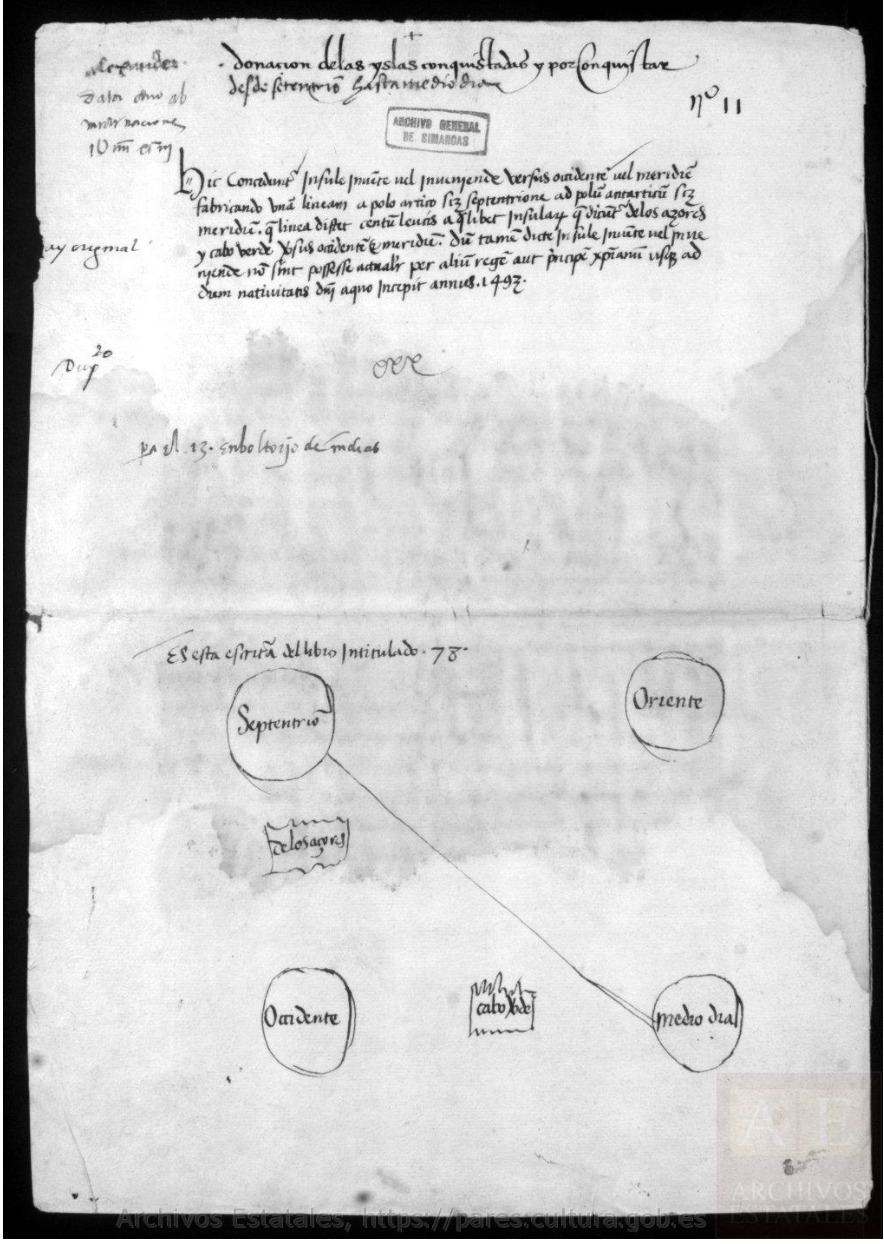 https://x.gd/wPqii |
|
| Inter caetera ('Among other
[works]') was a papal bull issued by Pope Alexander VI on 4 May 1493,
which granted to the Catholic Monarchs King Ferdinand II of Aragon and
Queen Isabella I of Castile all lands to the "west and south" of a
pole-to-pole line 100 leagues west and south of any of the islands of
the Azores or the Cape Verde islands.[1] It remains unclear whether the pope intended a "donation" of sovereignty or an infeudation or investiture. Differing interpretations have been argued since the bull was issued, with some arguing that it was only meant to transform the possession and occupation of land into lawful sovereignty. Others, including the Spanish crown and the conquistadors, interpreted it in the widest possible sense, deducing that it gave Spain full political sovereignty.[2] Inter caetera and its supplement Dudum siquidem (September 1493) are two of the Bulls of Donation.[3] While these bulls purported to settle disputes between Spain and Portugal, they did not address the exploratory and colonial ambitions of other nations, which became more of an issue after the Protestant Reformation. 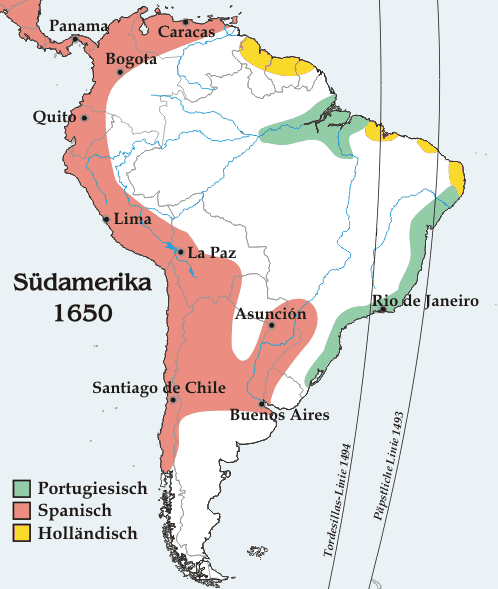 Map of South America; the meridian to the right was defined by Inter caetera (1493), the one to the left by the Treaty of Tordesillas (1494). Modern boundaries and cities are shown for purposes of illustration. |
Inter
caetera(「他の(作品)の中で」)は、1493年5月4日に教皇アレクサンダー6世が発行した教皇勅書であり、カトリック両王であるアラゴン王
フェルディナンド2世とカスティーリャ女王イサベル1世に、アゾレス諸島またはカーボベルデ諸島のいずれかの島から西および南に100リーグの極から極へ
の線より「西および南」のすべての土地を付与した。[1] 教皇が主権の「寄進」を意図していたのか、それとも封建的領有権や叙任を意図していたのかは、依然として不明である。この勅書が発行されて以来、さまざま な解釈が議論されており、土地の所有と占領を合法的な主権に変えることを意図しただけだと主張する者もいる。一方、スペイン王室や征服者たちを含む他の者 たちは、この勅書を可能な限り広い意味で解釈し、スペインに完全な政治的主権を与えたと結論づけた。[2] 『インター・カエテラ』とその補遺『ドゥドゥム・シキデム』(1493年9月)は、二つの「寄付教皇勅書」である。[3] これらの勅書はスペインとポルトガル間の紛争を解決する意図であったが、他の諸国の探検的・植民地的野心には言及しておらず、これは宗教改革後に一層問題 となった.  南アメリカの地図。右側の経線は『インター・カエテラ』(1493年)で定められたもの、左側の経線は『トルデシージャス条約』(1494年)で定められたものである。現代の国境と都市は説明のために示されている。 |
| Background Further information: Age of Discovery, Portuguese discovery of the sea route to India, Voyages of Christopher Columbus, and Portugal–Spain relations Before Christopher Columbus received support for his voyage from Queen Isabella and King Ferdinand of Spain, he had first approached King John II of Portugal. The king's scholars and navigators reviewed Columbus's documentation, determined that his calculations grossly underestimated the diameter of the Earth and thus the length of the voyage, and recommended against subsidizing the expedition. Upon Columbus's return from his first voyage to the Americas, his first landing was made in the Portuguese Azores; a subsequent storm drove his ship to Lisbon on 4 March 1493. Hearing of Columbus's discoveries, the Portuguese king informed him that he believed the voyage to be in violation of the 1479 Treaty of Alcáçovas. The treaty had been ratified with the 1481 papal bull Aeterni regis, which confirmed previous bulls of 1452 (Dum diversas), 1455 (Romanus Pontifex), and 1456 (Inter caetera),[2] recognizing Portuguese territorial claims along the West African coast. It was the King's understanding that the terms of the treaty acknowledged Portuguese claims to all territory south of the Canary Islands (which had been ceded to Spain).[4] Columbus's arrival in supposedly Asiatic lands in the western Atlantic Ocean in 1492 threatened the unstable relations between Portugal and Spain. With word that King John was preparing a fleet to sail to the west, the King and Queen of Spain initiated diplomatic discussions over the rights to possess and govern the newly found lands.[5] Spanish and Portuguese delegates met and debated from April to November 1493, without reaching an agreement. Columbus was still in Lisbon when he sent a report of his success to the Spanish monarchs. On 11 April, the Spanish ambassador conveyed the news to Pope Alexander VI, a Spaniard and the former Administrator of Valencia, and urged him to issue a new bull favorable to Spain.[6] At the time, Pope Alexander, as ruler of the Papal States, was embroiled in a territorial dispute with Ferdinand's first cousin, Ferdinand I, King of Naples, hence he was amicable to any requests of Isabella and Ferdinand, to the extent that they could write to Columbus saying that if he thought it necessary, one of the bulls would be modified. They were at Barcelona, in close touch with Rome. The camera apostolica became almost an extension of the Spanish Court, which secured a rapid succession of bulls virtually liquidating Portuguese claims.[7] The Pope issued edicts dated 3 and 4 May 1493. The third superseded the first two. A final edict, Dudum siquidem of 26 September 1493, supplemented the Inter caetera.[2] The first bull, Inter caetera, dated 3 May, recognized Spain's claim to any discovered lands not already held by a Christian prince, and protected Portugal's previous rights. Both parties found this too vague. The second bull, Eximiae devotionis, also dated 3 May, granted to the kings of Castile and León and their successors the same privileges in the newly discovered land that had been granted to the kings of Portugal in the regions of Africa, and Guinea.[8] The third bull, also entitled Inter caetera, dated 4 May, exhorts the Spanish monarchs to spread the faith west from a line drawn "one hundred leagues towards the west and south from any of the islands commonly known as the Azores and Cape Verde". Diffie notes that it has been suggested that this change may have been prompted by the Portuguese ambassador.[4] The Inter caetera and the following Treaty of Tordesillas defined and delineated a zone of Spanish rights exclusive of Portugal. In relation to other states the agreement was legally ineffective (res inter alios acta). Spain's attempts to persuade other European powers on the legal validity of the Inter caetera were never successful.[2] |
背景 詳細情報:大航海時代、ポルトガルによるインドへの海路発見、クリストファー・コロンブスの航海、ポルトガルとスペインの関係 クリストファー・コロンブスがスペインのイサベル女王とフェルナンド王から航海支援を得る前に、彼はまずポルトガルのジョアン2世に接触した。国王の学者 や航海士たちはコロンブスの資料を検討し、彼の計算が地球の直径を大幅に過小評価しており、したがって航海距離も過小評価していると判断した。彼らは遠征 への資金援助を認めないよう勧告した。コロンブスがアメリカ大陸への最初の航海から帰還した際、最初に上陸したのはポルトガル領アゾレス諸島であった。そ の後嵐に遭い、1493年3月4日に船はリスボンへ漂着した。コロンブスの発見を知ったポルトガル国王は、この航海が1479年のアルカソバス条約に違反 すると彼に伝えた。この条約は1481年の教皇勅書『エテルニ・レギス』で批准され、1452年(『ドゥム・デヴェルサ』)、1455年(『ロマーヌス・ ポンティフェクス』)、1456年(『インター・カエテラ』)の勅書を再確認し、西アフリカ沿岸におけるポルトガルの領有権を認めていた。国王は、この条 約の条項がカナリア諸島(スペインに割譲済み)以南の全領土に対するポルトガルの主張を認めるものと理解していた。[4] 1492年、コロンブスが西大西洋の、おそらくはアジアの土地に到達したことで、ポルトガルとスペインの不安定な関係に脅威が訪れた。ジョン王が西へ航海 するための艦隊を準備しているという情報を受け、スペイン国王と王妃は、新たに発見された土地の所有権と統治権について外交交渉を開始した。[5] 1493年4月から11月にかけて、スペインとポルトガルの代表者が会談し、議論を交わしたが、合意には至らなかった。 コロンブスは、リスボンに滞在しながら、スペイン国王夫妻に成功の報告を送った。4月11日、スペイン大使は、スペイン人であり、かつてバレンシアの行政 官であった教皇アレクサンダー6世にこの知らせを伝え、スペインに有利な新しい教皇勅書を発行するよう強く求めた。当時、教皇アレクサンダーは教皇領の支 配者として、フェルディナンドの従兄弟であるナポリ王フェルディナンド1世との領土紛争に巻き込まれていたため、イサベラとフェルディナンドの要求には友 好的な態度を示し、コロンブスに「必要であれば教皇勅書を修正する」と書簡で伝えるほどであった。彼らはバルセロナに滞在し、ローマと緊密に連絡を取り 合っていた。教皇庁は、スペイン宮廷の延長のような存在となり、ポルトガルの主張を事実上無効にする教皇勅書を次々と発行した。教皇は 1493 年 5 月 3 日と 4 日に勅書を発行した。3 番目の勅書は、最初の 2 つに取って代わった。1493 年 9 月 26 日の「Dudum siquidem」という最終的な勅書は、「Inter caetera」を補完するものであった。[2] 最初の教皇勅書『インター・カエテラ』(5月3日付)は、キリスト教君主が未占領の発見地に対するスペインの権利を認めつつ、ポルトガルの既存権利を保護した。両国ともこの内容は曖昧すぎると感じた。 第二の勅書『エクシミエ・デヴォティオニス』(同じく5月3日付)は、カスティリャ・レオン両王及びその後継者に対し、ポルトガル王がアフリカ及びギニア地域で認められていたのと同等の特権を新発見地において付与した。[8] 第三の教皇勅書『インター・カエテラ』(5月4日付)は、スペイン君主に対し「アゾレス諸島及びカーボベルデ諸島として一般に知られる諸島のいずれかから 西及び南へ百リーグの線」を基準に、西方の信仰普及を勧告した。ディフィーは、この変更がポルトガル大使の働きかけによる可能性が指摘されていると記して いる。[4] 『インター・カエテラ』と続くトルデシリャス条約は、ポルトガルを排除したスペインの権利区域を定義・画定した。他国との関係では、この合意は法的効力を 有さなかった(res inter alios acta)。スペインが他欧州列強に『インター・カエテラ』の法的有効性を説得しようとした試みは、決して成功しなかった。[2] |
| Provisions Inter caetera states: Among other works well pleasing to the Divine Majesty and cherished of our heart, this assuredly ranks highest, that in our times especially the Catholic faith and the Christian religion be exalted and be everywhere increased and spread, that the health of souls be cared for and that barbarous nations be overthrown and brought to the faith itself. ...[W]e ... assign to you and your heirs and successors, kings of Castile and Leon, ... all islands and mainlands found and to be found, discovered and to be discovered towards the west and south, by drawing and establishing a line from ... the north, ...to ...the south, ... the said line to be distant one hundred leagues towards the west and south from any of the islands commonly known as the Azores and Cape Verde.[9] The bull notes that the Isabella and Ferdinand "had intended to seek out and discover certain islands and mainlands remote and unknown" but had been otherwise engaged in the conquest of Granada.[9] The line of demarcation divided Atlantic zones only.[7] Spain and Portugal could pass each other toward the west or east, respectively, on the other side of the globe and still possess whatever lands they were first to discover. The bull was silent regarding whether lands to the east of the line would belong to Portugal, which had only recently reached the southern tip of Africa (1488) and had not yet reached India (1498). These lands yet "to be discovered" lay beyond those along the west coast of Africa as far as Guinea, and were given to Portugal via the 1481 bull Aeterni regis, which had ratified the Treaty of Alcáçovas.[10] For the time being, the question was in abeyance. |
規定 とりわけ次のように定めている: 神の御威光に喜ばれ、我らの心に愛される諸事業の中でも、とりわけこの事業は最高位にある。すなわち我らの時代に特にカトリックの信仰とキリスト教の宗教 が高められ、あらゆる場所で増し広められ、魂の健康が顧みられ、野蛮な諸国民が打ち倒され、信仰そのものへと導かれることである。...我々は...カス ティリャとレオンの王たる汝と汝の子孫及び後継者に対し...西と南の方角において発見され、また今後発見されるであろう全ての島々及び大陸を、...北 から...南へと引かれる線を基準として、... 北から...南へ...引かれた線は、アゾレス諸島及びカーボベルデ諸島として一般に知られる諸島のいずれからも、西及び南へ百リーグの距離を保つものと する。[9] 教皇勅書は、イサベルとフェルナンドが「遠隔かつ未知の諸島及び大陸を探求し発見する意図を持っていた」が、グラナダ征服に忙殺されていたと記している。[9] この境界線は大西洋域のみを分けた。[7]スペインとポルトガルは地球の反対側で互いに西進・東進しても、それぞれが最初に発見した土地を所有できた。教 皇勅書は境界線東側の土地がポルトガルに帰属するか否かについて言及しておらず、当時ポルトガルはアフリカ最南端(1488年)に到達したばかりで、イン ド(1498年)にはまだ到達していなかった。これらの「未発見の」土地は、アフリカ西海岸のギニアに至る地域を超えて存在し、1481年の教皇勅書『エ テルニ・レギス』によってポルトガルに与えられていた。この勅書はアルカソバス条約を批准したものである。[10] 当面の間、この問題は保留状態にあった。 |
| Effects and aftermath See also: Treaty of Tordesillas 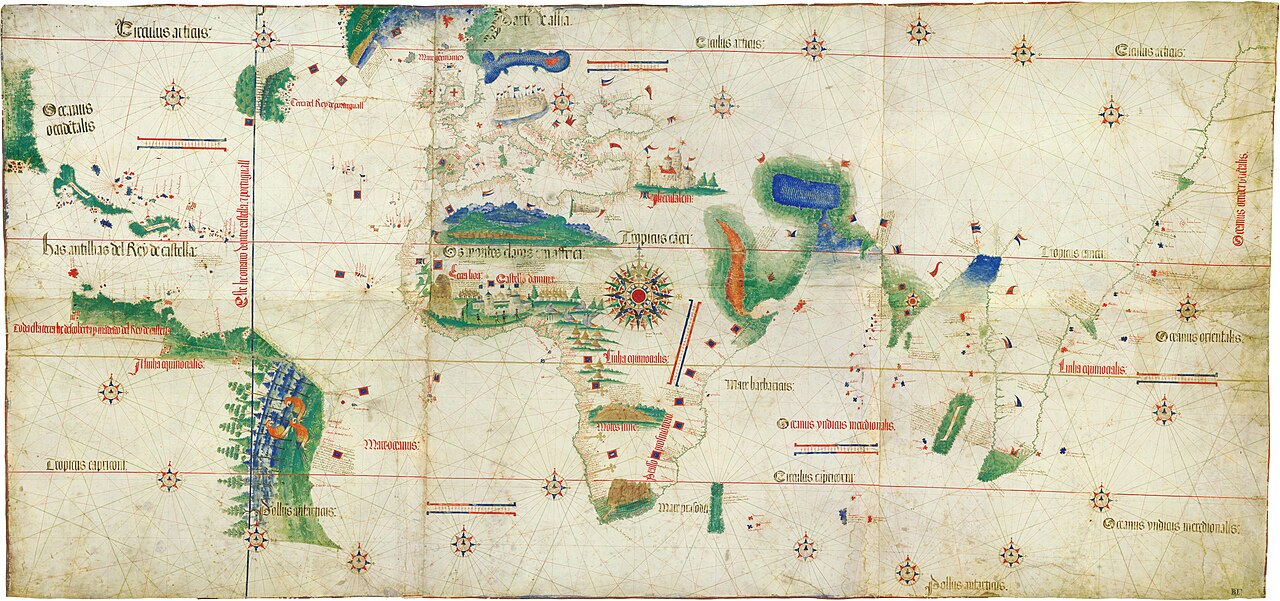 The Cantino planisphere of 1502 shows the line of the Treaty of Tordesillas. An important but unanticipated effect of this papal bull and the Treaty of Tordesillas was that nearly all the Pacific Ocean and the west coast of North America were given to Spain. King John II naturally declined to enter into a hopeless competition at Rome, and simply ignored the bulls, thus neither admitting their authority nor defying the Church. According to Oskar Spate, if Rome was in Ferdinand's pocket, highly placed personages at the Spanish Court were in King John's, and kept him well informed of its moves.[7] Controlling the sea lanes from Spain to the Antilles and in possession of bases in the Azores and Madeira, Portugal occupied a strategic naval position and he chose to pursue negotiations. 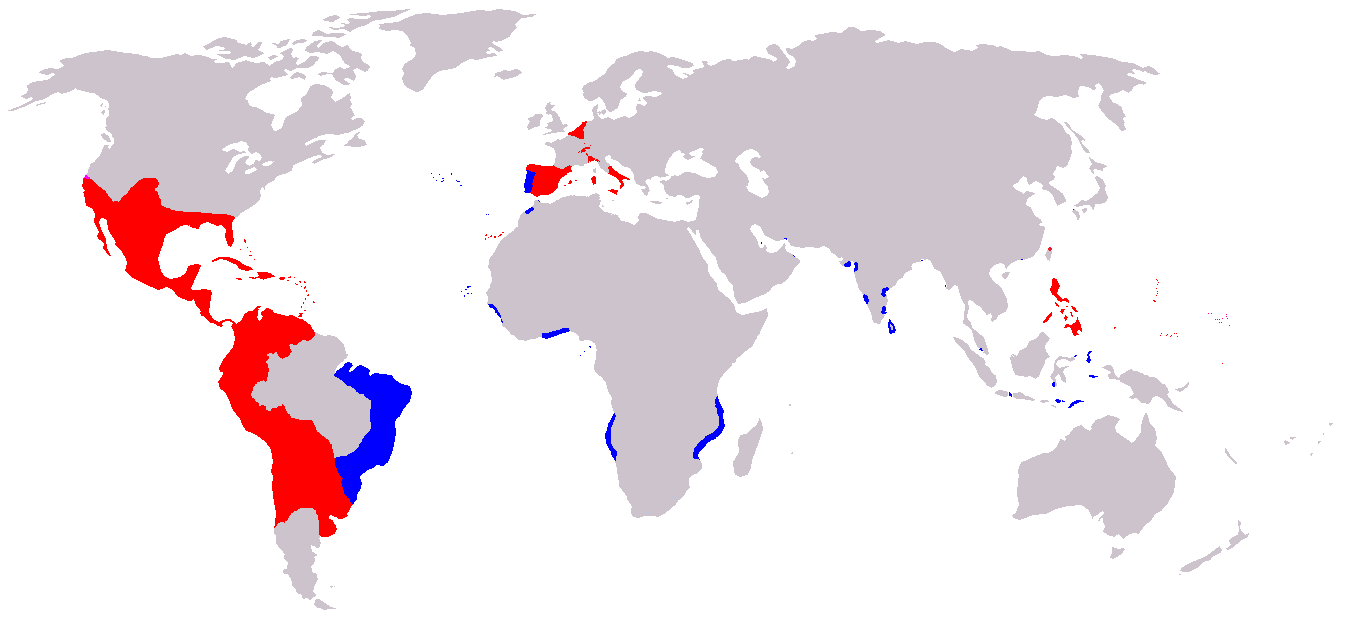 A map of the Spanish (red) and Portuguese Empires (blue) in the period of their personal union (1581–1640) Neither side paid any attention to Pope Alexander's bulls.[7] Instead, they negotiated the 1494 Treaty of Tordesillas, which moved the line further west to a meridian 370 leagues west of the Portuguese Cape Verde Islands, now explicitly giving Portugal all newly discovered lands east of the line.[11] In response to Portugal's discovery of the Spice Islands in 1512, the Spanish put forward the idea, in 1518, that Pope Alexander had divided the world into two halves.[12] By this time, however, other European powers had overwhelmingly rejected the notion that the Pope had the right to convey sovereignty of regions as vast as the New World. Even within Spain, influential voices such as Francisco de Vitoria had denounced the validity of the Inter caetera. While Spain never gave up its claims based on papal bulls, neither did the Spanish crown seek papal sanctions over the Atlantic Ocean line of demarcation. Rather, Spain negotiated directly with Portugal.[2] Piis fidelium On 25 June 1493, King Ferdinand secured another papal bull, Piis fidelium, appointing him apostolic vicar in the Indies. Father Bernardo Buil of the Order of Minims left Cádiz for America on 25 September 1493, on the second Columbus expedition. Once on the island of Hispaniola, Buil saw the effects of the conquistadors and quarreled with Columbus over the harsh treatment of colonists and Indians. Seeing that the situation for evangelization and catechizing was impossible, Buil left for Spain, defeated, within six months on 3 December 1494.[13] Two other friars whom he had left in the Americas returned to Spain in 1499. |
影響と余波 関連項目: トルデシリャス条約  1502年のカンティーノ世界地図には、トルデシリャス条約の境界線が示されている。 この教皇勅書とトルデシリャス条約がもたらした重要だが予期せぬ影響は、太平洋のほぼ全域と北米西海岸がスペインに与えられたことである。ジョン2世は当 然、ローマでの絶望的な競争に参加することを拒否し、教皇勅書を単に無視した。したがって、その権威を認めることも、教会に反抗することもなかった。オス カー・スペイトによれば、ローマがフェルディナンドの手中にあったのに対し、スペイン宮廷の高位の人物はジョン王の手中にあり、その動きを王にしっかりと 報告していた。[7] スペインからアンティル諸島への海路を支配し、アゾレス諸島とマデイラに拠点を所有していたポルトガルは、戦略的に重要な海軍の地位を占めており、交渉を 続けることを選んだ。  スペイン帝国(赤)とポルトガル帝国(青)が個人的な同君立国(1581年~1640年)だった時代の地図 両国とも、教皇アレクサンダーの勅書にはまったく注意を払わなかった[7]。その代わりに、1494年にトルデシリャス条約を締結し、境界線をさらに西、 ポルトガルのカーボベルデ諸島の西370リーグの経線まで移動させ、この境界線の東に新たに発見された土地はすべてポルトガルに属することを明確に定め た。[11] 1512年にポルトガルがスパイス諸島を発見したことを受け、スペインは1518年、教皇アレクサンダーが世界を2つに分割したという考えを打ち出した。 [12] しかし、この頃には、他のヨーロッパ列強は、教皇が新世界のような広大な地域の主権を譲渡する権利を持つという考えを圧倒的に拒否していた。スペイン国内 でさえ、フランシスコ・デ・ビトリアなどの影響力のある人物が、インター・カエテラ(Inter caetera)の有効性を非難していた。スペインは教皇勅書に基づく主張を決して放棄しなかったが、大西洋の境界線について教皇の認可を求めることもな かった。むしろ、スペインはポルトガルと直接交渉を行った。[2] Piis fidelium 1493年6月25日、フェルナンド王は新たな教皇勅書『Piis fidelium』を獲得し、自身をインド諸島の使徒座代理に任命した。ミニム会のベルナルド・ブイル神父は1493年9月25日、コロンブスの第二回遠 征に同行し、カディスからアメリカへ向けて出航した。イスパニョーラ島に到着したブイルは、征服者たちの所業を目の当たりにし、入植者や先住民への苛酷な 扱いを巡ってコロンブスと対立した。伝道と教理指導が不可能な状況と判断したブイルは、挫折して6ヶ月も経たない1494年12月3日にスペインへ帰還し た[13]。彼がアメリカ大陸に残した他の二人の修道士も、1499年にスペインへ戻った。 |
| Legacy and reaction This authorization to take non-Christian peoples' lands was cited by U.S. Chief Justice John Marshall almost 300 years later as he was developing the discovery doctrine in international law.[14] In the 21st century, groups such as the Shawnee, Lenape, Taíno, and Kanaka Maoli organised protests and raised petitions seeking to repeal the papal bull Inter caetera, and to remind Catholic leaders of "the record of conquest, disease and slavery in the Americas, sometimes justified in the name of Christianity", which they say has a devastating effect on their cultures today.[15] |
遺産と反響 この非キリスト教徒の土地を接収する権限は、約300年後、米国最高裁長官ジョン・マーシャルが国際法における発見主義を確立する際に引用された。[14] 21世紀に入り、ショーニー族、レナペ族、タイノ族、カナカ・マオリ族などの集団は抗議行動を組織し、教皇勅書『インター・カエテラ』の廃止を求める請願 書を提出した。彼らはカトリック指導者に対し、「キリスト教の名のもとに正当化されることもあった、アメリカ大陸における征服、伝染病、奴隷制の歴史」を 想起させようとしている。彼らは、この歴史が今日の自らの文化に壊滅的な影響を与えていると主張している。[15] |
| Catholic Church and the Age of Discovery Portuguese colonization of the Americas Treaty of Zaragoza |
カトリック教会と発見の時代 ポルトガルによるアメリカ大陸の植民地化 サラゴサ条約 |
| Notes 1. A single meridian is excluded because no lands can be south of it. Two partial meridians are possible, one extending north from a point west of the Azores and another extending south from a point south of the Cape Verde Islands, the two being connected by a north-northwest south-southeast line segment. Another possibility is a rhumb line west and south of the islands extending north-northwest and south-southeast. All rhumb lines reach both poles by spiraling into them. 2. Verzijl, Jan Hendrik Willem; W.P. Heere; J.P.S. Offerhaus (1979). International Law in Historical Perspective. Martinus Nijhoff. pp. 230–234, 237. ISBN 978-90-286-0158-1.. Online, Google Books entry 3. "The Möbius strip: a spatial history of colonial society in Guerrero, Mexico", Jonathan D. Amith, p. 80, Stanford University Press, 2005 ISBN 0-8047-4893-4 4. Diffie, Bailey Wallys (1977). Foundations of the Portuguese Empire, 1415–1580. U of Minnesota Press. ISBN 9780816607822 – via Google Books. 5. Kirkpatrick Sale The Conquest of Paradise, p. 123, ISBN 0333574796 6. A copy of Columbus's letter is known to have arrived in Rome by mid-April (it is mentioned in a Venetian chronicle dated 18 April), Kirkpatrick Sale, p. 124 7. Spate, O. H. K. (1979). "Chapter 2 The Alexandrine Bulls and the Treaty of Tordesillas". The Spanish Lake. Canberra: Australian National University Press. ISBN 0-7081-0727-3. 8. Pope Alexander VI, Eximiae Devotionis, 1493 9. "Inter Caetera". 4 May 1493. 10. "The Philippine Islands, 1493–1803 by Emma Helen Blair – Full Text Free Book (Part 1/5)". www.fullbooks.com. 11. The Treaty of Tordesillas did not specify any longitude, thus writers have proposed several, beginning with Jaime Ferrer's 1495 opinion provided at the request of and to the Spanish king and queen. 12. Edward Gaylord Bourne, "Historical Introduction", in The Philippine Islands 1493–1803 by Emma Helen Blair. 13. "Ecomienda Casas". California State University at Northridge. 14. "The Doctrine of Discovery Helped Define Native American Policies". 15. "Indigenous demand revocation of 1493 papal bull", National Catholic Reporter, 27 October 2000, John L. Jr. Allen |
注記 1. 単一の経線は除外される。その南側に陸地が存在し得ないためである。二つの部分的な経線が考えられる。一つはアゾレス諸島の西側地点から北へ延びるもの、 もう一つはカーボベルデ諸島の南側地点から南へ延びるもので、両者は北北西-南南東の線分によって接続される。別の可能性として、諸島の西側及び南側を北 北西-南南東方向に延びるロム線がある。すべてのロム線は、螺旋状に両極に向かって伸びている。 2. Verzijl, Jan Hendrik Willem; W.P. Heere; J.P.S. Offerhaus (1979). International Law in Historical Perspective. Martinus Nijhoff. pp. 230–234, 237. ISBN 978-90-286-0158-1.. オンライン、Google Books エントリ 3. 「メビウス帯:メキシコ、ゲレロにおける植民地社会の空間的歴史」、ジョナサン・D・アミス、80 ページ、スタンフォード大学出版、2005 年 ISBN 0-8047-4893-4 4. ディフィー、ベイリー・ウォーリス(1977)。『ポルトガル帝国の基礎、1415–1580』。ミネソタ大学出版局。ISBN 9780816607822 – Google Books経由。 5. カークパトリック・セール『楽園の征服』、p. 123、ISBN 0333574796 6. コロンブスの手紙の写しが 4 月中旬までにローマに到着したことが知られている(4 月 18 日付のヴェネツィアの年代記に言及がある)。カークパトリック・セール、124 ページ 7. スペイト、O. H. K. (1979). 「第 2 章 アレクサンダーの勅書とトルデシリャス条約」. 『スペインの湖』. キャンベラ: オーストラリア国立大学出版局. ISBN 0-7081-0727-3。 8. 教皇アレクサンダー6世、Eximiae Devotionis、1493年 9. 「Inter Caetera」。1493年5月4日。 10. 「フィリピン諸島、1493年~1803年、エマ・ヘレン・ブレア著 – フルテキスト無料書籍(パート1/5)」。www.fullbooks.com。 11. トルデシリャス条約は経度を特定していなかったため、作家たちは、スペイン国王と王妃の要請に応じてハイメ・フェレールが1495年に提出した意見をはじめ、いくつかの経度を提案している。 12. エドワード・ゲイロード・ボーン、「歴史的紹介」、エマ・ヘレン・ブレア著『フィリピン諸島 1493-1803』所収。 13. 「エコミエンダ・カサス」。カリフォルニア州立大学ノースリッジ校。 14. 「発見の教義はネイティブアメリカン政策の定義に役立った」。 15. 「先住民が1493年教皇勅書の撤回を要求」。ナショナル・カトリック・レポーター、2000年10月27日、ジョン・L・アレン・ジュニア。 |
| References Emma H. Blair, The Philippine Islands 1493–1803 Linden, H. Vander (1916). "Alexander VI. and the Demarcation of the Maritime and Colonial Domains of Spain and Portugal, 1493-1494". The American Historical Review. 22 (1): 1–20. doi:10.2307/1836192. ISSN 0002-8762. JSTOR 1836192. Scott, William Henry (1987). "Demythologizing the Papal Bull 'Inter Caetera'". Philippine Studies. 35 (3): 348–356. ISSN 0031-7837. JSTOR 42633027. |
参考文献 エマ・H・ブレア『フィリピン諸島 1493-1803』 リンデン、H. ヴァンダー (1916). 「アレクサンダー 6 世とスペインおよびポルトガルの海洋および植民地領域の境界設定、1493-1494」. 『アメリカ歴史評論』. 22 (1): 1–20. doi:10.2307/1836192。ISSN 0002-8762。JSTOR 1836192。 スコット、ウィリアム・ヘンリー (1987). 「教皇勅書『Inter Caetera』の神話解体」. フィリピン研究. 35 (3): 348–356. ISSN 0031-7837. JSTOR 42633027. |
| https://en.wikipedia.org/wiki/Inter_caetera |
+++
Links
リンク
文献
その他の情報



++
Copyleft,
CC, Mitzub'ixi Quq Chi'j, 1996-2099